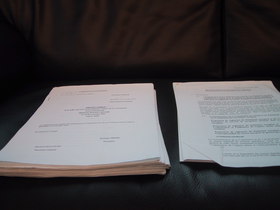Transparency

- (Photo: EUobserver.com)
Most progress on transparency within the EU has been achieved by the EU Court. It has forced the institutions to judge every document individually, instead of just rejecting applications on a wholesale basis. The progress established by the Court is now a part of the regulation on transparency adopted under co-decision and qualified majority on the basis of Art. 255 TEC.
Applications for access to documents must be processed by the institutions within 15 working days, but they often wait 10 days to register after they received a letter and can ask for 15 days more – and then refuse to answer. Individuals then have the right to send a new application to the institution asking it to reconsider its position, and finally, to go to the Ombudsman or the EU Court.
The institutions have improved their transparency by providing citizens with information via the internet. But, they still hide their internal deliberations on legislation from the public and even from the elected members of the national parliaments and the EU Parliament.
When the EU Parliament Committees discuss law proposals it is often on the basis of completely outdated versions. Sitting behind the MEP's are assistants or students from the permanent representations, the EU Commission and the Council, with the updated versions from the last meeting of the relevant Council working group. There, the real law-making takes place.
According to the conclusions of the EU summit of Seville in June 2002, the Council meetings should be opened to the public. Yet many restrictions have been maintained. Under the Greek Presidency in 2003, for example, only 8 Council meetings out of about 170 will be open to the public.
The future
The Convention on the Future of Europe proposes openness in all official Council meetings discussing new EU laws.But, the Convention will not yet open the law-making committees and give citizens a real insight into how their laws are decided.
The outgoing European Ombudsman, Jacob Söderman, has proposed a transparency and administrative reform.
The European Parliament has proposed that all meetings and documents are open unless ⅔ majority decide otherwise. This proposal has assembled support from 200 members and substitute members of the Convention but was still not inserted into the draft Constitution by the Praesidium.
Links
http://www.euro-ombudsman.eu.int/home/en/default.htm